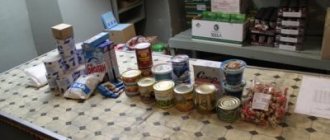How to send a parcel to a convicted person, delivery, parcel post, money transfer? Relatives of the convicted person are allowed to send parcels, packages, parcels to the correctional facility. Parcels, packages, parcels can be sent to convicted women and persons held in the VK without any limitation on the number. The number of parcels, transfers and parcels for convicted men depends on the type of correctional facility and the conditions in which they are serving their sentence. The penitentiary establishment establishes: ordinary, simplified, and strict conditions for serving the sentence.
What can you do in a pre-trial detention center?
Formally, life in a pre-trial detention center is regulated by Order of the Ministry of Justice of the Russian Federation dated October 14, 2005 N 189 “On approval of the Internal Regulations of pre-trial detention centers of the penal system.”
One of the appendices to these rules is a list of what is allowed in a pre-trial detention center. Its full title is “List of basic necessities, shoes, clothing and other industrial goods, as well as food products that suspects and accused may have with them, store, receive in parcels and transfers, and purchase by bank transfer.” We quote it verbatim:
“Suspects and accused may carry, store, receive in parcels, transfers and purchase by bank transfer:
- clothes in one set (including the established sample) without waist belts, suspenders and ties, shoes without arch supports, laces and metal heels:
- shirt;
- suit (jacket), trousers;
- dress;
- skirt, shorts;
- sweater (jacket);
- summer/demi-season jacket;
- winter jacket (coat, sheepskin coat, fur coat);
- tracksuit or dressing gown for women;
- demi-season sports hat (cap, baseball cap), headscarf;
- winter hat (cap, baseball cap);
- gloves (mittens);
- summer/demi-season shoes;
- winter shoes;
- sports shoes;
- slippers;
- underwear no more than 4 sets:
- underpants;
- socks (knee socks);
- bra;
- T-shirt (t-shirt);
- stockings (tights), leggings;
- handkerchiefs (knitted, paper);
- toiletries (toilet, laundry soap, toothpaste (powder), dental floss, toothbrush, plastic cases for soap and toothbrush, comb, comb, nail clippers without sharp elements and files, cotton swabs, cotton pads);
- electric razor, disposable safety razors;
- duffel bag or bag;
- glasses and plastic cases for glasses;
- hand cream (face, body), gauze, hairpins, Vaseline, cotton wool, sanitary tampons, pads, cosmetics, plastic curlers (for women);
- crutches, wooden canes, prostheses (with a doctor’s permission);
- a factory-made household electric boiler or electric kettle with a power of no more than 0.6 kW;
- with the doctor's permission, an electric tonometer, a glucometer, a hearing aid, consumables and batteries for them;
- a washcloth or sponge, a foam sponge for washing dishes;
- ballpoint or gel fountain pen, refills for it (black, purple, blue), a simple pencil;
- writing paper, notebooks, plastic files or folders, postal envelopes, postcards, postage stamps;
- toilet paper, including those issued or purchased in a store (stall) of a pre-trial detention center;
- religious items for body or pocket wear;
- plain white or beige bed linen in one set (two sheets and a pillowcase), towels (no more than 2 pieces), a textile sleep mask, earplugs;
- literature and periodicals from the library of the pre-trial detention center or purchased through the administration of the pre-trial detention center in the trading network, with the exception of materials with extremist, erotic and pornographic content;
- photo cards;
- board games (checkers, chess, dominoes, backgammon);
- plastic or aluminum mug, plastic plate, spoon, fork (plastic mug and cutlery should be intended for hot dishes and reusable);
- diapers, including disposable, disposable diapers;
- child care items, children's clothing (for women with children under three years of age).
The same rules say that suspects and accused persons can the following items in pre-trial detention centers
- Phone cards
- Household chemicals:
- toothpaste (powder),
- shaving cream (gel),
- cosmetical tools,
- intended for use after shaving,
- deodorant,
- liquid soap,
- shower gel,
- shampoo,
- washing powder,
- dishwashing liquid.
- Products (with restrictions, see below)
- Cigarettes (except for minors who are kept in pre-trial detention centers - they cannot smoke)
What is not allowed in a pre-trial detention center?
- Cell phones
- Cards, gambling
- Aerosols
- Products:
- Packaged in metal or glass containers;
- Requiring heat treatment;
- Perishable;
- With an expired shelf life or the date of manufacture of which it is not possible to determine;
- Yeast;
- Alcoholic drinks and beer.
What products are best to put in the transfer to a pre-trial detention center?
Approximately this list is offered by experienced people who know what is allowed in a pre-trial detention center and what is not.
- Vegetable oil - it can be added to the food given to prisoners to improve its taste.
- Bouillon cubes also make food tastier.
- Black tea with medium-leaf and small-leaf consistency. It is better to give two packages - one large and cheaper one to share with your co-carriers, and a second, higher quality one for yourself.
- Instant coffee.
- Cookies or gingerbread.
- Lard is well stored, even if there is no refrigerator, and is a source of animal fat.
- Sausage - smoked, or preferably raw smoked.
- Canned food - but not much, since they must be opened and placed in a plastic container (as mentioned above, products in metal packaging are not accepted), which means they cannot be stored for a long time (this applies to canned fish, meat and condensed milk) .
- Sweets – without filling, non-alcoholic.
- Honey is a source of microelements; it must be transparent and contained in plastic, not glass, containers.
- You should choose ghee butter, which has a longer shelf life.
- Fresh vegetables and fruits.
- Dried fruits – they weigh less than fresh fruits.
- To prepare various drinks, you can transfer milk powder, tomato paste and citric acid, preferring soft plastic or polyethylene packaging.
- Cheese is better smoked.
- Salt, sugar - either in sand or cubes.
You can put instant food in the package - noodles, soups, potatoes, but during inspection the bags will be gutted, so it is better to buy them at the kiosk at the pre-trial detention center. The same can be said about cigarettes. Of course, you can bring them with you, but, alas, during inspection they will be broken to reveal prohibited items.
How to prepare products for transfer?
All products must be in transparent packaging. You will have to pour literally everything into them - coffee and tea, sugar, cigarettes, instant noodles; sweets are also accepted without wrappers. The bags must be tied so that they can be easily untied. It's worth stocking up on additional packages in case some of the main ones break through. Everything brought must be put in a large bag, in which the gifts will go to the prisoner.
Remember that the list of permitted products may be limited in a particular detention center. It is better to clarify by phone in advance what is allowed in a pre-trial detention center and what is not.
What do you need to know about the store in the detention center?
Find out what assortment is available in the store in the detention center itself. The fact is that the total weight of parcels and packages per month is 30 kilograms. These are both things and products. It would be logical if it was something that could not be found in the prison store. In addition, products purchased there are considered “verified” - they are no longer subject to any inspection. Therefore, perhaps, instead of carrying a heavy parcel, it is worth transferring money to a relative. In addition, the relatives themselves can submit an application to the pre-trial detention center, in which they indicate what goods and in what quantity they want to purchase for “their” prisoner.
By the way, Moscow and Moscow region pre-trial detention centers are serviced by online stores. This gives relatives the opportunity to save time, money and nerves and at the same time choose something truly useful, not limited to what is sold in the pre-trial detention center store.
Rules for sending parcels to prison
The list of approved products for prison transfer is established for all types of correctional facilities at the federal level. However, this does not prevent the creation of special rules for receiving transmissions in each of them.
Therefore, before going on a date or before preparing a parcel for shipment, it is better to find out in advance what rules are established in your colony.
All parcels undergo a thorough inspection by correctional officers.
In some colonies, even when checking the parcel, the guards allow themselves to open stewed meats, yoghurts, break sausages and chocolate. Thus, they check whether the food contains items prohibited in the colony.
If you want to avoid inspection, purchase goods and products at a special kiosk located on the territory of the prison or detention center. No one will check these products.
What food and things can be sent to prison?
The list of food and essential goods is strictly limited. Many products that are a luxury for convicts are prohibited, primarily due to their limited shelf life. Prisons should be given practical items and products that can be stored for months or years.
So, it is allowed to transfer the following things to the colonies:
- Products, the list of which is fixed by special laws.
- Cigarettes are one of the most valuable goods that can be used to pay inmates. Therefore, it is passed on even to non-smokers.
- Personal goods (toothpaste and brush, wooden comb, toilet paper and napkins, sanitary pads, laundry soap, aluminum or plastic plates and mugs).
- Warm clothes – tracksuit, socks and underpants, a change of clothes.
- Literature for reading, pen and notebook, unless prohibited by internal rules.
- Electric razors and boilers are also allowed in some isolation wards.
Socks can be donated up to 10 pairs per month, and briefs - up to 5 pieces.
The list of permitted products for transfer to prison is as follows:
- Instant noodles (about 20-30 packets);
- Instant cereals and mashed potatoes using boiling water;
- Bouillon cubes in quantities up to half a kilogram;
- Small-leaf and medium-leaf black tea in the amount of two packs - one for the common fund and the second for the prisoner;
- Vegetable oil (sunflower or olive) in an amount of up to 3 liters helps improve the quality of any prison food;
- Instant jelly and milk powder;
- Instant coffee;
- Raw smoked sausage and salted lard, sometimes salted fish, and even then not in all correctional institutions;
- Honey in transparent containers, condensed milk;
- Butter is allowed to be given only to convicts in pre-trial detention centers;
- Bread;
- Canned food no more than 2 cans, as they are subject to opening and lose their shelf life;
- Dried fruits;
- Candies such as caramel;
- Vegetables, especially onions and garlic, are popular and loved by prisoners.
If any of the products are in cardboard packages, you should unpack them in advance and leave them in transparent ones.
Those that do not have transparent packaging should be placed in packaging bags and tied, but so that employees can untie them. Otherwise, they will simply tear them apart.
Many people are interested in the question of how to transfer medications to a colony . Medicines are actually allowed to be transferred only those that are necessary for a sick prisoner only on the basis of a conclusion or prescription from a correctional institution doctor. Everything else will most likely not be missed.
What is prohibited for transfer?
Please note that everything that you give to your relative will not only be consumed by him. As a rule, all parcels are absorbed by the prisoners together.
The following types of products and goods will not be accepted into the colony or isolation ward:
- All perishable products - eggs, cheeses and others, which must be stored in the refrigerator at a temperature below 8 degrees;
- All products that require cooking - boiling, frying or stewing;
- Meat and fish, vegetables and fruits that are in vacuum packaging;
- All alcohol and drugs, kvass, as well as sugar and yeast, from which you can make your own alcoholic drinks;
- Money;
- Weapons and items that can be used as weapons;
- Items of monetary value;
- Playing and topographic cards;
- Clocks and optical instruments;
- Any photographic equipment and office equipment;
- Materials containing pornography;
- Liquids based on alcohol-containing substances;
- Phones, SIM cards and flash drives.
If you try to transfer any of the prohibited goods, an administrative case will be opened against you, which will be considered by a magistrate.
As a punishment, you will be given a fine . Therefore, check your bags in advance for any remaining money or other prohibited items.
The search by correctional facility staff is very thorough . For example, one lady tried to carry a SIM card in her own genitals, but she failed. One can only guess how the inspection of visitors in the colonies is carried out.
The weight of a transfer to a maximum security colony is limited to 20 kg, to a pre-trial detention center – 30 kg . However, as of 2021, new rules have come into force, according to which the maximum transmission weight has increased to 50 kg.
Unfortunately, many colonies did not take this innovation into account. But this only became a reason to appeal their decisions to ban such broadcasts.
What is recommended to put in the transfer?
Experienced relatives of convicts advise putting the following things in transfers to general, strict and special regime colonies.
From hygiene items
- Soap. In addition to the usual one, it is worth passing on tar, which destroys insects.
- Razor.
- Toothbrush
- Toothpaste.
- Shampoo - and you need to be prepared that you will be asked to pour it into a plastic bag.
- Toilet paper, sanitary pads, wipes (both wet and dry).
- Washcloth.
- Deodorant (preferably roll-on).
From food
Here it is worth remembering that you cannot transfer products that require heat treatment and homemade pickles (see the list of prohibited items).
You shouldn’t hand over perishable food – refrigerators are not available everywhere. Experienced people also advise stocking up on transparent plastic bags (in case, during the inspection, the colony staff asks you to put the food you brought into them), as well as a large bag or sack in which the parcel will be delivered to the prisoner.
Below we offer a list of what can be transferred to a general, strict and special regime colony and what will be especially useful to those who are there.
- Canned food.
- Instant noodles and mashed potatoes.
- Bakery products.
- Sausage is better smoked, which does not spoil longer.
- Cheese is also better smoked.
- Fruits, vegetables, herbs - whole, not cut into pieces.
- Nuts, dried fruits.
- Salt, sugar - either in sand or cubes.
- Sweets – without filling, non-alcoholic. Prison staff may ask you to separate the candy from the candy wrappers and place it in a transparent bag.
- Tea, instant coffee. You also need to be prepared for the fact that you will be asked to pour the tea into a transparent bag.
Other useful things in the colony:
- Cigarettes – even if a prisoner does not smoke, cigarettes can serve as currency that he can exchange for something he needs. Most likely, during inspection the cigarettes will have to be removed from the pack.
- Matches.
- Plastic dishes.
- Plastic basin for washing.
- Boiler.
- Electric kettle.
- Books (colony staff may not miss some books - see the list of prohibited items; it is better to take classical authors).
Approximately the same list is recommended for parcels to a general regime, strict regime and special regime colony, with the adjustment that it is better to completely exclude perishable products here. Small volume printed products are sent by parcel post.








